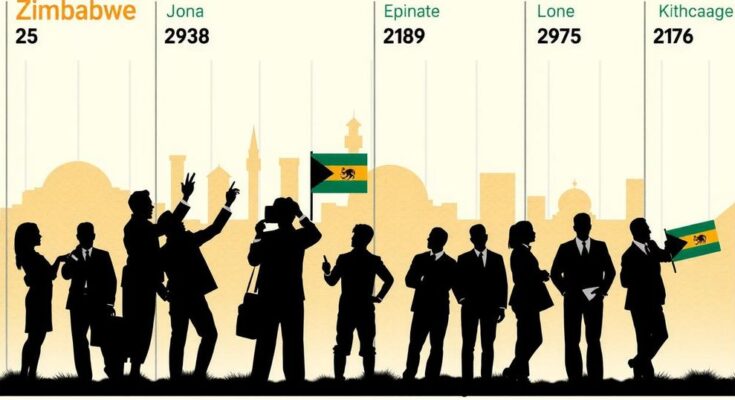The government of Zimbabwe faces mounting pressure to abandon its “command” exchange rate for the Zimbabwe Gold (ZiG) currency, which is causing significant currency distortions that threaten retail operations. Economists advocate for a free-floating exchange rate, citing the unsustainable nature of current policies, while the gap between official and parallel market rates widens, contributing to economic instability.
The Zimbabwean government is facing escalating demands to relinquish its controversial “command” exchange rate for the Zimbabwe Gold (ZiG) currency, which was implemented in April. Business owners have reported that their operations are becoming untenable due to the mandatory adherence to the official exchange rate. Consequently, many businesses have been compelled to modify prices in ZiG to mitigate further financial losses, as the local currency continues its rapid devaluation on the parallel market. Economist Gift Mugano has openly criticized the government’s strategy, insisting that the Reserve Bank of Zimbabwe (RBZ) should permit the ZiG to operate under a free-floating exchange system. “The central bank must liberalize the exchange rate,” Mugano stated, adding, “We are in the midst of a storm, and while the right policies must be implemented, the necessary groundwork to make this work was not laid before the ZiG was launched.” In May, RBZ Governor John Mushayavanhu initiated a crackdown on supermarkets that were allegedly breaching government policies concerning the exchange rate. He even threatened to revoke the licenses of non-compliant businesses. Nevertheless, the issue of currency distortions persists, with the ZiG being traded at significantly higher rates on the parallel market compared to the official interbank rate. Economists and business leaders alike are raising alarms over the situation. Vince Museve highlighted the disconnect between the value of the ZiG and gold prices, indicating that market perceptions and confidence, rather than official policies, are driving the currency’s value. “This market is mainly informal and not influenced by RBZ policies,” Museve remarked. Retailers have corroborated these concerns, noting an increasingly widening gap between the formal and informal markets. The Retailers Association of Zimbabwe has reported that suppliers are maintaining dual price lists—one for local currency and another for foreign currency—primarily due to the shortages of foreign currency and the excessive volatility of the ZiG rates. “This situation is unsustainable,” the association declared, noting that price increases in US dollars contribute to inflation and subsequently drive consumers from formal retailers to informal markets. Denford Mutashu, the president of the Confederation of Zimbabwe Retailers, has called for constructive dialogue between the government and the business sector to mitigate the ongoing crisis. Despite the government’s efforts to inject over $100 million into the market to stabilize the currency, the ZiG was trading between ZiG35 and ZiG40 per US dollar on the alternative market, while the official interbank rate remains at ZiG13.98. Analysts express concern that such a widening gap could incite further rent-seeking behaviors and exacerbate the economic turmoil.
Zimbabwe is currently grappling with significant economic challenges, including a persistent currency crisis. The introduction of the Zimbabwe Gold (ZiG) currency in April aimed at stabilizing the economy while promoting trade and commerce. However, the government’s imposition of a “command” exchange rate has resulted in distortions that adversely affect businesses and consumers alike. Economists highlight the need for a more flexible exchange rate that reflects market realities, as many businesses struggle with pricing in an increasingly volatile economic environment. This situation is compounded by a shortage of foreign currency and increasing inflation, creating a complex scenario where formal and informal markets diverge.
In summary, the worsening economic landscape in Zimbabwe necessitates a reevaluation of the existing exchange rate policy for the ZiG. The government’s command exchange rate is increasingly seen as unworkable by business leaders and economists who are advocating for a liberalized currency policy. As the gap between the official and parallel market rates widens, pressing issues such as inflation, currency volatility, and sustainability of business operations remain critical. Constructive engagement between the government and business sectors is essential to navigate this crisis and restore stability in Zimbabwe’s economy.
Original Source: bulawayo24.com




